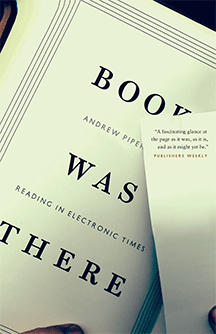Book Was There: Reading in Electronic Times
Andrew Piper. University of Chicago Press, 2012. 192 pages. $22.50.
By David Madden
To make Andrew Piper’s excellent, profound, unique, sometimes challenging perspective on reading in electronic times more readily and specifically accessible, the reader may prepare by considering every conceivable aspect of the act of reading. What, why, where, when, and how does one read seem to be basic questions easily answered, but the nuances of each are myriad. For instance, Piper’s meditation on reading includes the many implications of touch (fingers that hold, that turn pages), time (starting, stopping, returning), and space (a domestic nook, a wooded bower, a public library) throughout the history of reading. Reading Piper’s book one may quite naturally collaborate with him as he enumerates.
Making a leap, readers will be doubly prepared if they review every aspect of the nature, practice, and probable future applications of their experiences on line, including more than the obvious social media, such as Facebook and Twitter.
The ultimate, unavoidable question is, of course, how have the reading and the electronic experiences affected your own life and thus the lives of those with whom you have had contact? For instance, have you achieved a sense of community, Piper asks, and how does your reading community differ from your electronic community? Armed with your own answers to such questions, reading Piper’s analyses, insights, and theories about the effect upon humanity in general will be more enjoyable and enlightening. He ends each chapter by turning from the abstract to his young daughter’s experiences in the present and by imagining her future engagement with books and electronics.
Piper’s is a book with a message: as we dream less and less in books and immerse ourselves more and deeply in electronic streaming, etc., we do well to keep in mind the many parallels between the nature and history of books and reading and the nature and evolving progress of electronic media. “Can we bridge the gap between the computational and the literal and instead posit their intersection as a new core of intellectual life? Will this not be a prerequisite for the literacy of the future?… Our digital future is indelibly linked to our bibliographic past…. My hope is that these two categories, work and play, will remain as interwoven throughout” the lives of people in the future “as the instruments that they use to engage in them, the book and the computer.”
He demonstrates the fact that “nothing is ever new.” As the internet has Facebook and faces of various other types, so books have always had faces, our own and others, as in illuminated scrolls and books of the ancient past, and in frontispieces of books (illustrations densely populated with faces), and later the faces of authors left of the title pages.
Hands turning or flipping pages forward and backward, the reading eye browsing, roaming, zooming in on and marking passages clearly parallel similar actions as we click our way through the electronic universe. Marginalia, annotations for our future use or for the fascination of future owners of our books are like Twitter notes to unknown populations. A difference in this example has much to do, Piper stresses, with the question of sharing and community in the contexts of time and space. As readers, what we do, for good or ill, is interred with our bones, but what we do on the internet rests forever in a vast and deep graveyard that is there, but not there.
In his epilogue, Piper exhorts readers, with measured enthusiasm, to let go of the book, as it was and is, but to salvage what we can and mesh it with aspects of the universal electronic experience as it evolves. Having just finished the wondrous 600 pages of The Old Wives Tale by the neglected English author Arnold Bennett (clearly our loss) and now reaching with great expections for Thomas Carlyle’s very long The French Revolution, I am less inclined than Piper to make common cause with travelers on the information highway. Even so, I am quite content to have been in the company of the man who wrote Book Was There.
Like many phrases from the works of Gertrude Stein, Piper’s title alone, unlike the title of his first work, Dreaming in Books, will not likely lure many readers. He teaches German and European literature at McGill University, but his learning is vaster, more immense than that, as the thirty-page annotated bibliography for this heady book attests. I join those who will make a foot-stomping demand for an analytical index in the next, updated, augmented edition.
Meanwhile, as the years of change in the way we read and the way we travel the World Wide Web pass, Piper’s pied book may serve as a trustworthy or somewhat dubious guide.
David Madden (ΦBK, University of Tennessee, 1979) is a novelist and resident member of the Epsilon of Tennessee chapter of Phi Beta Kappa. HIs most recent novels are Abducted by Circumstance and London Bridge in Plague and Fire. Forthcoming is his third collection of stories, The Last Bizarre Tale.
